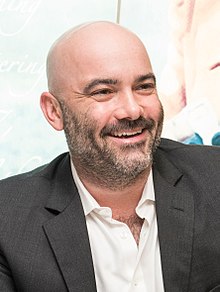Philipp Meyer (writer)
Philipp Meyer (born May 1, 1974 in New York City ) is an American writer .
biography
Philipp Meyer grew up in Hampden , northwest of Baltimore , as the son of an artist and an electrician. He attended Baltimore City College , which he left with a GED at sixteen. For the next five years he worked as a bicycle mechanic and occasionally as a helper in a shock trauma facility. At twenty he attended college courses in Baltimore and decided to become a writer. Two years later he went to Cornell University in Ithaca and graduated with a degree in English.
Meyer then got a position as a derivatives trader at the Swiss UBS bank with further training in Zurich and London. After a few years, his dream of being a writer was within reach thanks to a scholarship from the Michener Center for Writers in Austin , Texas , where he wrote most of his first novel, American Rust . In 2008 he received a Master of Fine Arts from the Michener Center and in 2010 a scholarship from the John Simon Guggenheim Memorial Foundation . Further scholarships from MacDowell and The Anderson Center for the Arts followed. In addition to his novel, Meyer wrote short stories for American and English newspapers. He lives in Austin, Texas.
reception
Philipp Meyer's debut novel American Rust ( German rust ) tells of the internal and external decline of America. Rust as a symbol of lethargy and decay, of desolation and hopelessness. But rust is also a metaphor for a prosperous steel industry that is decaying, and for an affected population that no longer dreams of an American dream, but stands helplessly in front of the rusting remnants of their existence. The plot of the novel is placed in this archaic setting. American Rust has received several awards and the novel has been translated into several languages.
In 2013, the novel was published in The Son ( German The first son ), which was a bestseller in the United States. He tells of Eli McCullough, who was kidnapped by the Comanches in 1849 and lived among the Indians for three years. The Indian way of dealing with nature, the wars against other tribes and the attacks on white settlers are described. Eli founds a family dynasty that grew very rich through cattle breeding and later oil fields, so the plot of the family novel almost extends to the present day. The first son was largely judged positively, among other things because the author could design characters that “the reader will not ingratiate themselves”. The “great art” of the narrator is to “impressively describe” everyday culture, thinking and feeling. A review by Spiegel criticized that the German version of the novel contained translation errors.
With The Son , Philipp Meyer was one of the finalists for the 2014 Pulitzer Prize in the fiction category . A series of the same name has been broadcast since 2017 .
Publications
- Rust . Klett-Cotta Verlag , Stuttgart 2010, ISBN 978-3-608-93893-7 (Original title: American Rust . 2009. Translated by Frank Heibert ).
- The first son . Albrecht Knaus Verlag , Munich 2014, ISBN 978-3-8135-0479-8 (Original title: The Son . 2013. Translated by Hans M. Herzog).
Awards
- 2009: Los Angeles Times Book Prize - Art Seidenbaum Award for First Fiction, American Rust
- 2010: Dobie Paisano Fellowship
- 2010: Guggenheim Fellowship
Web links
- Literature by and about Philipp Meyer in the catalog of the German National Library
- Short biography and reviews of works by Philipp Meyer at perlentaucher.de
- Official website of Philipp Meyer (English)
- Philipp Meyer about The Son , on YouTube (English)
Individual evidence
- ↑ Jennifer L. Knox: Philipp Meyer. In: The New Yorker. June 14, 2010, accessed October 20, 2014 .
- ^ A b Philipp Meyer, Author of The Son and American Rust. (No longer available online.) Archived from the original on December 26, 2015 ; accessed on October 20, 2014 (English). Info: The archive link was inserted automatically and has not yet been checked. Please check the original and archive link according to the instructions and then remove this notice.
- ^ Carolyn Kellogg: Festival of Books: author Philipp Meyer. In: Los Angeles Times. April 23, 2010, accessed October 20, 2014 .
- ↑ Hartmut Wilmes: Where America's Power Rots . In: Kölnische Rundschau . September 1, 2010.
- ↑ Emily Witt : Stake Through the Heart: A Bad Breakup for Philipp Meyer and Esther Newberg. In: New York Observer. June 21, 2011, accessed October 20, 2014 .
- ↑ Christoph Schröder: No country for young men. In: Zeit Online. August 23, 2010, accessed October 20, 2014 .
- ↑ Thomas Klingenmaier: Rob what can be robbed . In: Stuttgarter Zeitung . July 11, 2014, p. 38 .
- ^ Jobst-Ulrich Brand: The white Indian. In: Focus magazine. June 2, 2014, accessed October 20, 2014 .
- ↑ Oliver Junge: Take what you want, but be ready to die for it. In: Frankfurter Allgemeine Zeitung. July 11, 2014, accessed October 20, 2014 .
- ↑ Annemarie Stoltenberg: The wild west as it really was. In: NDR culture. May 27, 2014, archived from the original on July 12, 2014 ; Retrieved October 20, 2014 .
- ↑ Martin Doerry : The Taste of Blood . In: Der Spiegel . No. 36 , 2014 ( online ).
- ^ The 2014 Pulitzer Prize Winners. Retrieved October 20, 2014 .
| personal data | |
|---|---|
| SURNAME | Meyer, Philipp |
| BRIEF DESCRIPTION | American writer |
| DATE OF BIRTH | May 1st 1974 |
| PLACE OF BIRTH | New York City |
